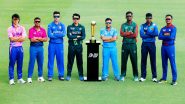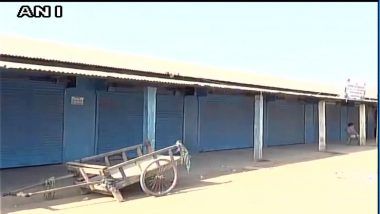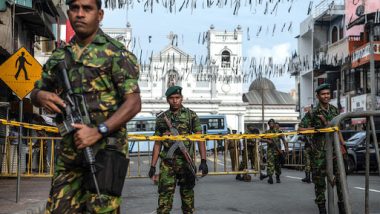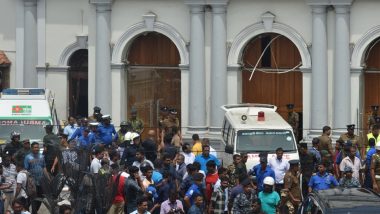Colombo, May 15: Sri Lanka's police reimposed night curfews in vulnerable areas on Wednesday and arrested over 100 people in connection with the communal riots which targeted Muslim-owned businesses in the aftermath of the deadly Easter Sunday bombings.
The police announcement came hours after authorities lifted the nationwide restrictions on people's movements and assembly. The curfew will be imposed in the North Western province and the Gampaha Police division from 7 PM tonight till 4 AM Thursday, News First quoted police spokesperson SP Ruwan Gunasekara as saying. Serial Blasts In Sri Lanka on Easter Sunday, Churches And Hotels Hit; Nearly 156 People Dead, Over 400 Injured.
The Air Force would deploy helicopters at day and night to assist with controlling illegal assemblies and acts of violence, Sri Lanka Air Force spokesman Group Captain Gihan Seneviratne said.
"We have already taken measures to obtain aerial photographic evidence of those involved in such activities and to direct such evidence for legal action against lawbreakers," he said.
Police spokesman Ruwan Gunasekera said at least 78 people were arrested from the worst-affected North-Western Province (NWP) for the anti-Muslim violence.
Rest of the suspects were arrested from other parts of the country, he said.
"In addition to the 78 arrested and remanded after they were produced in court, video footage from the incidents are being reviewed to make more arrests," Gunasekera said.
The majority Sinhala community mobs vandalised Muslim-owned properties in NWP and adjoining Gampaha district in the Western Province, a senior police officer said, adding that the mobs even defied the curfew to attack Muslim properties which resulted in the death of one person.
Gunasekera said among the arrested were state and private sector employees. They have been remanded till 29 May. The island-wide curfew was imposed on Monday after violence against the Muslim community which accounts for 10 per cent of the country's population. The curfew was briefly lifted on Tuesday before being reimposed for a second straight night following reports of fresh violence in some parts of the country.
"The curfew imposed in the North-western Province and Gampaha Police division was removed at 6 AM Wednesday while the curfew in the other areas of the island ended at 4 AM," police media spokesman's office stated.
Earlier, Gunasekara said: "Thirty-three suspects arrested in connection with the anti-Muslim riots have been remanded and over 60 people have been arrested. The suspects can be sentenced to 10 years in prison under the International Covenant on Civil and Political Rights (ICCPR)".
The police media spokesman said the illegal activities committed by the persons engaged in violence will be noted in their police certificates. The academic activities of all schools and state institutions in the province were resumed on Wednesday, the Wayamba Province Governor Peshala Jayaratne said.
The recent violence is a fresh backlash from the Easter attacks where nine suicide bombers, including a woman, carried out a series of devastating blasts that tore through three churches and three luxury hotels, killing 258 people and injuring over 500 others.
Muslims said that rioters went about destroying their properties and setting fire to them even after curfew hours. They accused the security forces and the police for becoming silent watchers to the rioting.
Muslim political parties said at least one person was killed in the riots. The attacks come during the Muslim holy month of Ramazan. The government has imposed a ban on social media following the violent clashes. The government which blocked Facebook and WhatsApp on Tuesday extended the blockade to Twitter.
The social media blockade is meant to prevent the spread of rumours and hate comments, the Telecommunications Regulatory Authority said. Sri Lanka has a population of 21 million which is a patchwork of ethnicities and religions, dominated by the Sinhalese Buddhist majority. Muslims account for 10 per cent of the population and are the second-largest minority after Hindus. Around seven per cent of Sri Lankans are Christians.













 Quickly
Quickly



















